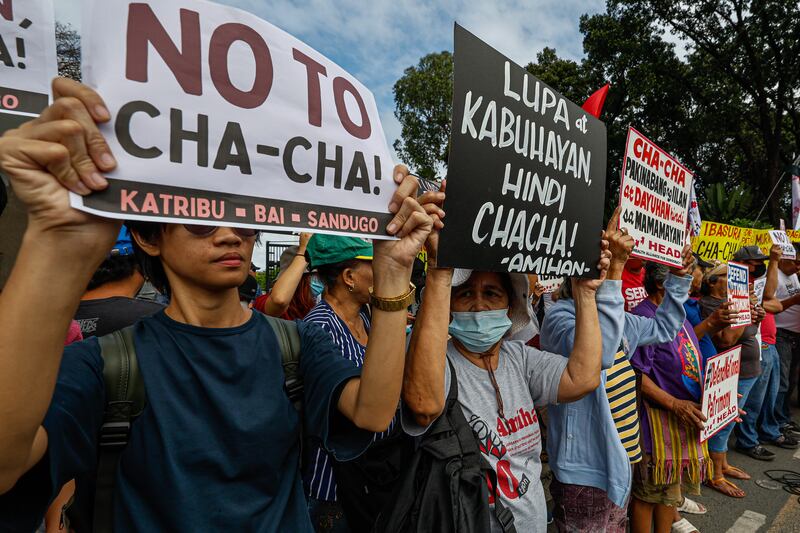The Department of National Defense will rigorously protect the Philippines’ sovereignty, the defense chief said Monday in response to ex-leader Rodrigo Duterte’s comments from last week backing the idea of independence for his home region of Mindanao.
Duterte made the comments amid an escalating feud with his successor, President Ferdinand Marcos Jr., who, as the former leader suggested, was attempting to amend the constitution to remove presidential term limits.
On Monday, Defense Secretary Gilberto Teodoro Jr. said that his department’s mandate was to “secure the sovereignty of the state and integrity of the national territory” as enshrined in the constitution.
“We will strictly enforce this mandate whether externally or internally,” he said in a statement.
When BenarNews asked Teodoro’s office to clarify his remarks, it said his statement was made “in the context of the calls for secession of Mindanao.”
The dispute threatens to break up a power alliance between the Duterte and Marcos families, the country’s two leading political dynasties.
They joined forces in the 2022 election that brought Marcos, the namesake son of longtime Philippine dictator Ferdinand E. Marcos, to office. Duterte’s daughter, Sara, serves as his vice president and education secretary.
Marcos’ nephew, who heads the House of Representatives, recently expressed interest in contesting the 2028 election, potentially pitting him against Sara Duterte.
At a press conference last Tuesday, Duterte said he supported moves for a “separate and independent Mindanao,” referring to the main island in the southern Philippines. It had been home to a long-running separatist insurgency before the rebels agreed to a 2014 peace deal with Manila that gave them control of an autonomous Muslim region in Mindanao.
When Duterte was president (2016-2022), he was a strong advocate of the peace process that brought about the autonomous region.
In his comments on Jan. 30, Duterte said that a political ally had first pushed the “desirability of Mindanao seceding from the Republic of the Philippines.” He said he initially supported a signature campaign to get this done.
The former president had claimed that the constitution could be changed by gathering enough signatures from “all [over] Mindanao, verified under oath in the presence of so many people to decide [if] we want to separate.”
Duterte said that he had initially approved plans to push for charter change, during his presidential tenure, but only to allow his government to devolve powers away from the center in Manila to Mindanao. But he abandoned the idea, local media said, after experts advised him that the time wasn’t right for a federal system back then.
A devolution of powers for Mindanao or any other region towards a more federal system is a good move on paper, analysts have said, because it would give regional bodies the power to handle their own affairs.

But there have been widespread fears that politicians in the Southeast Asian nation could use the proposed changes to extend term limits. Under the charter, a president can only have a single six-year term.
Responding to Duterte’s threat, National Security Adviser Eduardo Año on Sunday warned that the government “will not hesitate to use its authority and forces to quell and stop any and all attempts to dismember the republic.”
“In light of recent calls to separate Mindanao from the rest of the Philippines, we underscore the importance of national unity, security and stability,” he said in a statement.
Año referred to the “hard-won gains” of the peace agreement with separatists in Mindanao, saying any talk of secession could undo those positive developments.
“The comprehensive peace process, which brought an end to decades of armed conflict in Mindanao, must be vigorously safeguarded and built upon,” he said.
The possibility of Marcos changing the constitution is one of a few reasons for the feud between the Marcoses and the Dutertes.
Duterte, 78, firmly believes that a Marcos-backed campaign to amend the constitution, ostensibly to allow in more foreign investment, is actually a move to do away with presidential term limits.
These limits were instituted after Marcos’ father was removed from power in a people-power revolt in 1986 after more than three decades in power.
Duterte, in a speech late last month, warned Marcos against such a move, saying he could end up like his father.
That Marcos in December had allowed into the country investigators from the International Criminal Court to gather evidence for its case against Duterte's deadly drug war, did not please the former president's supporters either.
They weren’t mollified by Marcos firmly saying that his administration “would not lift a finger” to help the ICC investigation because it was a threat to the country’s sovereignty.
Meanwhile, Military chief Gen. Romeo Brawner, who visited military camps across the southern Philippines at the weekend, reminded soldiers to stay united and be wary of enemy efforts to infiltrate various sectors of society, following Duterte’s call for independence.
“Let us focus on our duty,” Brawner said. “We have only one Philippines, only one country.”
Jojo Riñoza and Gerard Carreon in Manila contributed to this report.
